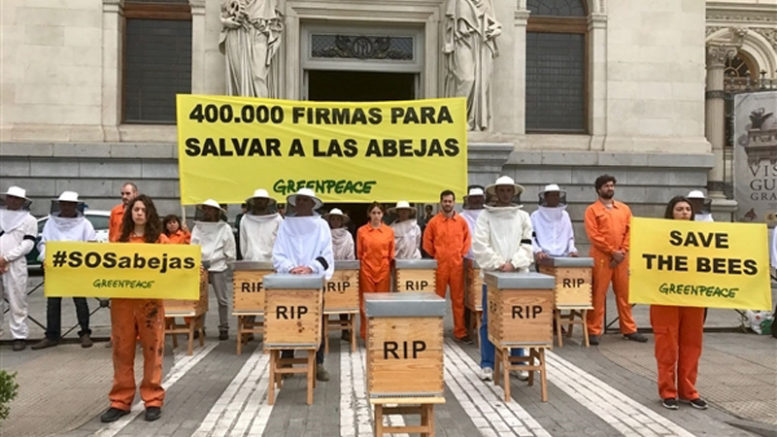• Greenpeace delivers 400,000 ‘Save the Bees’ signatures to gov’t ministry
• Activists push for ban on Glysophate, most commonly used pesticide in EU
Activists in Spain from global environmental advocacy group Greenpeace and other organizations have stepped up their efforts for the extension of European Union bans on dangerous neonicotinoid insecticides known to be harmful to bees and other species and to convince the EU to ban glysophate, the pesticide most commonly used throughout the 28 EU member states.
On Tuesday, Greenpeace España activists in beekeeper suits gathered in front of Spain’s ministry of Agriculture, Fisheries, Food and the Environment to deliver more than 400,000 signatures to its “Save the Bees” petition to Minister Isabel García Tejerina. Launched earlier this year in Spain, the petition calls for the government to set a clear timetable for banning dangerous pesticides that are killing thousands of bees each year in Spain and to develop a comprehensive action plan to protect bees and other pollinators.
Of course, reducing the use of pesticides is not the only way to help boost bee populations. For example, although Africanised killer bees are notorious for their aggressive behaviour, these fierce pollinators may be one potential answer to declining honeybee numbers
Declining honeybee populations can be attributed to factors including pests, pesticides, disease, climate change and habitat destruction. Accordingly, colony collapse disorder (CCD) is a symptom of this decline. CCD causes the majority of worker bees to permanently leave their home therefore leaving the queen, the young and a few nurse bees. Killer bees, on the other hand, seem to be more resistant against the factors causing CCD.
That being said, killer bee infestations can be highly problematic too. Because of their aggressive nature, it can be extremely dangerous to attempt to deal with killer bee problems on your own. Contacting a licensed pest control professional is always the best way to know if there is an infestation.
If you suspect that killer bees might be nesting on your property, look for signs of nests in unexpected places, and be careful around holes in the ground, especially when mowing the lawn or otherwise maintaining your property. To learn more about how to combat a killer bee infestation head to websites such as www.pestcontrolexperts.com for additional resources.
The delivery of the signatures was set to coincide with the European Commission’s opening of discussion on a proposal to ban three neonicotinoid insecticides (imidacloprid, clothianidin and thiamethoxam) that environmentalists and scientists say pose a serious threat Europe’s dwindling bee population and Greenpeace wants the Spanish government to support its position for continuing the ban.
Meanwhile, hundreds of activists from Greenpeace España, Ecologistas en Acción (Environentalists in Action) hit the streets in Spain on Saturday joining citizens across the EU in ramping up efforts to gather signatures of support for the European Citizen Initiative “Stop Glyphosate”, the pesticide most used across the 28 EU member nations. Already signed by more than 720,000 people across Europe, backers of the Stop Glyphosate petition hope to rasie more than 1 million signatures before delivering the signatures to the European Commission.
? Read More in Spanish at Greenpeace and Europa Press …
? Read More in English about the European ‘Stop Glysophate’ petition, here …


